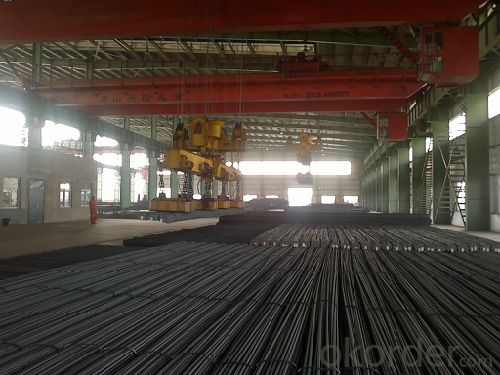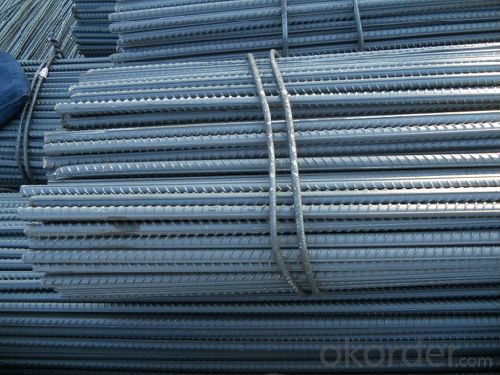Deformed Bar Steel Rebar Made in China with High Quality for Construction
- Loading Port:
- China main port
- Payment Terms:
- TT or LC
- Min Order Qty:
- 25 m.t.
- Supply Capability:
- 100000 m.t./month
OKorder Service Pledge
OKorder Financial Service
You Might Also Like
Product Description:
OKorder is offering Deformed Bar Steel Rebar Made in China with High Quality for Construction at great prices with worldwide shipping. Our supplier is a world-class manufacturer of steel, with our products utilized the world over. OKorder annually supplies products to European, North American and Asian markets. We provide quotations within 24 hours of receiving an inquiry and guarantee competitive prices.
Product Applications:
Deformed Bar Steel Rebar Made in China with High Quality for Construction are ideal for structural applications and are widely used in the construction of buildings and bridges, and the manufacturing, petrochemical, and transportation industries.
Product Advantages:
OKorder's Deformed Bar Steel Rebar Made in China with High Quality for Construction are durable, strong, and resist corrosion.
Main Product Features:
· Premium quality
· Prompt delivery & seaworthy packing (30 days after receiving deposit)
· Corrosion resistance
· Can be recycled and reused
· Mill test certification
· Professional Service
· Competitive pricing
Packaging & Delivery of Deformed Bar Steel Rebar Made in China with High Quality for Construction:
Packaging Detail: products are packed in bundle and then shipped by container or bulk vessel, deformed bar is usually naked strapping delivery, when storing, please pay attention to moisture proof. The performance of rust will produce adverse effect.
Each bundle weight: 2-3MT, or as required
Payment term: TT or L/C
Delivery Detail: within 45 days after received advanced payment or LC.
Label: to be specified by customer, generally, each bundle has 1-2 labels
Trade terms: FOB, CFR, CIF
FAQ:
Q1: Why buy Materials & Equipment from OKorder.com?
A1: All products offered byOKorder.com are carefully selected from China's most reliable manufacturing enterprises. Through its ISO certifications, OKorder.com adheres to the highest standards and a commitment to supply chain safety and customer satisfaction.
Q2: How do we guarantee the quality of our products?
A2: We have established an advanced quality management system which conducts strict quality tests at every step, from raw materials to the final product. At the same time, we provide extensive follow-up service assurances as required.
Q3: How soon can we receive the product after purchase?
A3: Within three days of placing an order, we will begin production. The specific shipping date is dependent upon international and government factors, but is typically 7 to 10 workdays.
Images:


- Q:What are some innovative applications of special steel?
- Some innovative applications of special steel include its use in the construction of high-rise buildings, bridges, and other infrastructure projects, where its strength and durability are crucial. Special steel is also utilized in the automotive industry for the manufacturing of lightweight yet strong components, such as car frames and engine parts. Furthermore, it is used in the aerospace sector for aircraft manufacturing, as it offers excellent resistance to extreme conditions and high temperatures. Additionally, special steel is employed in the medical field for the production of surgical instruments and implants due to its biocompatibility and corrosion resistance.
- Q:What are the different joining methods used for special steel?
- The different joining methods used for special steel include welding, brazing, soldering, and mechanical fastening.
- Q:What are the requirements for special steel used in railway applications?
- The requirements for special steel used in railway applications are quite stringent due to the demanding nature of the industry. Here are some of the key requirements: 1. High strength and durability: Special steel used in railway applications must have excellent strength and durability to withstand the heavy loads and constant vibrations experienced by trains. This helps prevent deformation, fatigue, and failure of the steel components. 2. Wear resistance: Railway tracks and other components are subject to significant wear and tear due to the constant movement of trains. Special steel used in railway applications should have good wear resistance to ensure a longer service life and reduce maintenance costs. 3. Corrosion resistance: Railway tracks and structures are often exposed to various environmental conditions, such as rain, snow, and chemicals. Special steel used in railway applications should have high corrosion resistance to prevent rusting and degradation, ensuring the longevity of the components. 4. Fatigue resistance: Trains undergo repetitive loading cycles, leading to fatigue in the steel components. Special steel should have excellent fatigue resistance to prevent cracking and failure, thereby ensuring the safety and reliability of railway systems. 5. High impact toughness: Special steel used in railway applications must possess high impact toughness to absorb energy during sudden shocks or accidents. This helps prevent catastrophic failures and ensures the safety of passengers and railway personnel. 6. Heat resistance: In some railway applications, such as high-speed trains, steel components are exposed to high temperatures due to friction or other sources. Special steel should have good heat resistance to maintain its mechanical properties and structural integrity even under elevated temperatures. 7. Dimensional stability: Special steel used in railway applications should exhibit excellent dimensional stability to maintain the required tolerances and alignment of various components. This ensures smooth operation, reduces noise, and prevents excessive wear. These are some of the primary requirements for special steel used in railway applications. Meeting these requirements is crucial to ensure the safe, reliable, and efficient operation of railway systems.
- Q:What are the different methods for improving the electrical conductivity of special steel?
- There are several methods for improving the electrical conductivity of special steel, including alloying, heat treatment, and surface modifications. Alloying involves adding elements like copper, nickel, or silver to the steel to enhance its conductivity. Heat treatment processes such as annealing or quenching can also improve conductivity by altering the microstructure of the steel. Additionally, surface modifications like electroplating or coating can be employed to enhance electrical conductivity.
- Q:What are the thermal conductivity properties of special steel?
- Special steel, also known as alloy steel, exhibits high thermal conductivity properties. This is due to the presence of various alloying elements, such as chromium, nickel, and manganese, which enhance heat transfer. The specific thermal conductivity value of special steel depends on its composition and can vary, but it generally has good heat transfer capabilities.
- Q:What is the significance of carbon content in special steel?
- The carbon content in special steel is significant as it determines the steel's strength, hardness, and overall performance. Higher carbon content usually results in increased hardness and strength, making it suitable for applications that require high durability and resistance to wear. On the other hand, lower carbon content enhances the steel's ductility and ease of machining. The right balance of carbon content in special steel allows manufacturers to tailor the material to specific needs, ensuring optimal performance in various industries such as automotive, aerospace, and construction.
- Q:Can special steel be used for cutting tools?
- Yes, special steel can be used for cutting tools. Special steels, such as high-speed steel or tool steel, are specifically designed to have superior hardness, toughness, and wear resistance, making them ideal for manufacturing cutting tools that can withstand high temperatures and perform precision cutting operations.
- Q:How is special steel used in the production of engine components?
- Special steel is used in the production of engine components due to its exceptional strength, durability, and resistance to heat and corrosion. It is commonly used to manufacture parts such as crankshafts, camshafts, connecting rods, and valves, which are subjected to high stress and temperature conditions. The special steel's properties enable these components to withstand the demanding operating conditions of engines, resulting in enhanced performance, reliability, and longevity.
- Q:What are the main alloying elements used in special steel?
- The main alloying elements used in special steel can vary depending on the specific type of special steel, but common alloying elements include chromium, nickel, molybdenum, vanadium, and tungsten. These elements are added to enhance the steel's properties such as corrosion resistance, strength, hardness, and heat resistance.
- Q:What are the different methods of preventing stress relaxation in special steel?
- Some of the different methods of preventing stress relaxation in special steel include heat treatment, surface coating or plating, stress relieving, and proper design and engineering of the components. These methods help to minimize the relaxation of stress in the steel, ensuring its performance and durability over time.
1. Manufacturer Overview |
|
|---|---|
| Location | |
| Year Established | |
| Annual Output Value | |
| Main Markets | |
| Company Certifications | |
2. Manufacturer Certificates |
|
|---|---|
| a) Certification Name | |
| Range | |
| Reference | |
| Validity Period | |
3. Manufacturer Capability |
|
|---|---|
| a)Trade Capacity | |
| Nearest Port | |
| Export Percentage | |
| No.of Employees in Trade Department | |
| Language Spoken: | |
| b)Factory Information | |
| Factory Size: | |
| No. of Production Lines | |
| Contract Manufacturing | |
| Product Price Range | |
Send your message to us
Deformed Bar Steel Rebar Made in China with High Quality for Construction
- Loading Port:
- China main port
- Payment Terms:
- TT or LC
- Min Order Qty:
- 25 m.t.
- Supply Capability:
- 100000 m.t./month
OKorder Service Pledge
OKorder Financial Service
Similar products
New products
Hot products
Related keywords






























